Greetings
Here’s the idea behind “A Canadian, an American, a Lawyer, and an Elitist”: Rhett’s favorite movie is Meatballs 4, Shawn has an unhealthy fixation on Resident Evil, Richard scoffs at anything that isn’t pretentious and hoity toity, and Adam is a prick who hates everything. We all watch far too many movies, and spend our time analyzing them. So we each watch the same movie, write our analysis of them, and then go to a chat room to discuss it, unaware of what the others have written. A warning: if you haven’t seen the film we are discussing, it may not be best to read this article, because it is spoiler heavy.
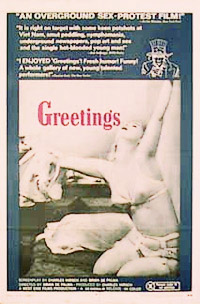 |
Analysis by a Canadian: Rhett Miller
Over his expansive career, Brian De Palma has been known for his meticulously planned shots: the figure eight around the gymnasium in Carrie, the eight camera exploding head setup in The Fury and the seemingly endless opening tacking shot in Snake Eyes. These shots demonstrate direction with a planned and practiced visual style, some of the most precise and perfect of all cinema. So it comes as all the more surprising that Greetings, De Palma’s first completed film (The Wedding Party was shot in ’63 but not released until a year after Greetings in swingin’ ’69), seems so unrehearsed and impromptu. Indeed, it is really about anti-structure, filled with an organizational freedom that very much mirrors the time in which it was made. In the carefree way it groups together unrelated stories, unrelated characters and unpredictable style it has a sloppy freshness that could only have worked in the late sixties. The film is all over the place, but that is its charm.
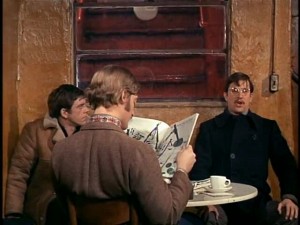 Not only does the film have a free-flowing structure akin to sixties “whateverrrr man” mentality, but the film is also very sixties in its plot fixations. The three characters, Paul (Jonathan Warden), Lloyd (Gerrit Graham) and Jon (Robert De Niro in his film debut) are all fixated on distinctly sixties preoccupations. Paul, in an age of free love and casual dating, tries to connect with women from the post impersonal of all sixties methods – the computer. Lloyd, with his college campus psycho-babble, sounds off endlessly on conspiracy and assassination, the conversational cup du jour after the deaths of JFK and Martin Luther King. Jon, with his perceptive gaze, is an aspiring filmmaker and peeping tom, two things that could have only occurred in the late sixties with the newly portable camera equipment of the day. Not only do the three leads have these sixties hang-ups, but the film also has a flagrant display of “free love”-inspired nudity (fitting, since it was the first film to receive an “X” rating in the USA, predating I am Curious – Yellow by a few months) and continual reference to Vietnam. Since it appears to be a film of firsts – the first film for De Palma and De Niro and the first X-rated motion picture in America, it may as well be dubbed the first commercial film to lampoon America’s involvement with Vietnam.
Not only does the film have a free-flowing structure akin to sixties “whateverrrr man” mentality, but the film is also very sixties in its plot fixations. The three characters, Paul (Jonathan Warden), Lloyd (Gerrit Graham) and Jon (Robert De Niro in his film debut) are all fixated on distinctly sixties preoccupations. Paul, in an age of free love and casual dating, tries to connect with women from the post impersonal of all sixties methods – the computer. Lloyd, with his college campus psycho-babble, sounds off endlessly on conspiracy and assassination, the conversational cup du jour after the deaths of JFK and Martin Luther King. Jon, with his perceptive gaze, is an aspiring filmmaker and peeping tom, two things that could have only occurred in the late sixties with the newly portable camera equipment of the day. Not only do the three leads have these sixties hang-ups, but the film also has a flagrant display of “free love”-inspired nudity (fitting, since it was the first film to receive an “X” rating in the USA, predating I am Curious – Yellow by a few months) and continual reference to Vietnam. Since it appears to be a film of firsts – the first film for De Palma and De Niro and the first X-rated motion picture in America, it may as well be dubbed the first commercial film to lampoon America’s involvement with Vietnam.
There were several better films released throughout the sixties, but no film seems to synthesize all of the sixties themes into as short and tight of a package as is done in Greetings. If ever there were to be a sixties film capsule buried beneath Hollywood, Greetings would be the only film required. Complaints can be lodged against the film’s sloppy structure, its lack of adequate punchlines or real development of ideas, but that would really be against the point. Wearing its X-rating proudly on its sleeve, this is a film that basks in its freedom, refusing at any point to conform to standard Hollywood conventions. This is De Palma popping the cherry of a new wave of American filmmaking, where anything goes. There is a scene where an “Abolish HUAC” sign can be read in the background, and although it does not factor into the film’s narrative, its inclusion in the film is nonetheless important. The HUAC was a without a doubt the most oppressive legislative body in the history of American filmmaking, stifling the creativity of hundreds of American filmmakers. The HUAC was so vehemently against freedom of expression, and the “Abolish HUAC” poster in Greetings symbolizes how the era of oppression in Hollywood is gone, and freedom is new mode d’expression. Greetings is about as far removed from the HUAC era as possible, the poster showing just how far Hollywood has come.
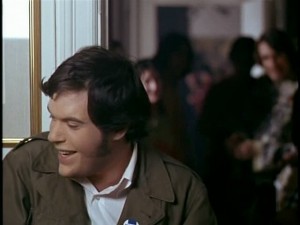 Brian De Palma would refine his style with the funnier and more polished sequel to Greetings, Hi, Mom!, but in a way that polish makes Hi, Mom! less interesting of a film. Greetings works precisely because it is all over the map. We jump from a monologue of LBJ to fast-motion running across the downtown New York to scenes in the battlefields of Vietnam. There is no real rhyme or reason to the happenings, but the madcap structure gives the film an undeniable charm. It’s a reckless movie, and trying to explain it is about as relevant as devising the meaning behind the ending of 2001. Like the tagline for 2001, Greetings is “The Ultimate Trip”, a window into all-things sixties, where ideas were important, even if they never really materialized into much more than that. Greetings hasn’t a care in the world for anything, right down to its brilliant final shot. Rather than serve his country, Jon uses Vietnam as a chance for him to make his ultimate piece of “Peep Art”, capturing the entire thing on Super 8. You know you are watching something different when Vietnam becomes a film’s funniest joke. Greetings is wild, reckless, unkempt and sort of brilliant.
Brian De Palma would refine his style with the funnier and more polished sequel to Greetings, Hi, Mom!, but in a way that polish makes Hi, Mom! less interesting of a film. Greetings works precisely because it is all over the map. We jump from a monologue of LBJ to fast-motion running across the downtown New York to scenes in the battlefields of Vietnam. There is no real rhyme or reason to the happenings, but the madcap structure gives the film an undeniable charm. It’s a reckless movie, and trying to explain it is about as relevant as devising the meaning behind the ending of 2001. Like the tagline for 2001, Greetings is “The Ultimate Trip”, a window into all-things sixties, where ideas were important, even if they never really materialized into much more than that. Greetings hasn’t a care in the world for anything, right down to its brilliant final shot. Rather than serve his country, Jon uses Vietnam as a chance for him to make his ultimate piece of “Peep Art”, capturing the entire thing on Super 8. You know you are watching something different when Vietnam becomes a film’s funniest joke. Greetings is wild, reckless, unkempt and sort of brilliant.
Analysis by an American: Shawn McLoughlin
No one will watch Greetings and consider it a masterpiece. It’s not a low-budget phenomenon, an impressive indie, or anything close. But, at times, it is pretty funny in a National Lampoon-meets-The Monkees kind of way. It is almost impossible to view this film without being firmly planted in this decade. Greetings is a product of its time and it shows. There are moments when the film becomes campy for the sake of mirroring popular culture of its time. This is most evident where the film decides it needs an interlude of the characters running up and down steps really quickly and goofing around in parks. Any style that these scenes demonstrate was copied directly from The Monkees television program, and pop-films such as A Hard Day’s Night.
This isn’t distracting any from the story, because the story seems to take place in the same world as those other films, with realism and current events only added in as an afterthought. Instead of being chased around a mansion by Frankenstein’s Monster, or some other silly ghost, these “Monkees” have the lingering threat of repressed sexuality, distrust of the government, and the Vietnam conflict. However, when these “satirical” aspects are added, they get lost in the fun and games.
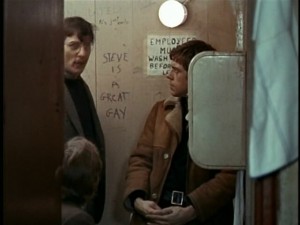 Paul (Jonathan Warden) suffers the worst, a fact made sadder in that his character largely has nothing to do, and worse, nothing to plot forward. When the film ended, I felt his story was unresolved to my satisfaction, even if his “computer dates” were amusing. De Niro’s character Jon Rubin gets the most screen time. Seeing him in a comedy where he is not forced in to imitating himself from a previous film (“You talkin’ to me?”) is very refreshing. If you can get past thinking forward to his more serious roles, he almost seems perfectly fit for comedy. He plays his lines as if he were a more subdued Sam Raimi in any of his Super 8 films. He is pretty funny, and there is great fun in the “voyeur” scene where De Niro is directing a girl on how to undress naturally. Forced laughter is later expected towards the end when De Niro is sent to Vietnam, and is directing a VC through a war reporter’s camera to do the same as the earlier girl.
Paul (Jonathan Warden) suffers the worst, a fact made sadder in that his character largely has nothing to do, and worse, nothing to plot forward. When the film ended, I felt his story was unresolved to my satisfaction, even if his “computer dates” were amusing. De Niro’s character Jon Rubin gets the most screen time. Seeing him in a comedy where he is not forced in to imitating himself from a previous film (“You talkin’ to me?”) is very refreshing. If you can get past thinking forward to his more serious roles, he almost seems perfectly fit for comedy. He plays his lines as if he were a more subdued Sam Raimi in any of his Super 8 films. He is pretty funny, and there is great fun in the “voyeur” scene where De Niro is directing a girl on how to undress naturally. Forced laughter is later expected towards the end when De Niro is sent to Vietnam, and is directing a VC through a war reporter’s camera to do the same as the earlier girl.
So far, none of these characters are zany enough for anything though. Alone, you might think they would be mostly boring, and they are. Enter: The Lloyd. Lloyd is the “wacky and zany” he is the Groucho that this movie needs to accomplish many of its goals. He talks directly to the camera, playing to the audience, and manages to get a girl completely naked, which he uses as a tool to prove his JFK assassination theories to the audience. This also helps the movie get its then marketing tool of an “X” rating. Apparently, Lloyd becomes “too close” to finding out the truth, and Fox Mulder wasn’t alive yet to protect him. He gets shot by an invisible bullet, from an invisible assailant, and leaves no sign of any blood.
But what is the point? Is it supposed to be a sex comedy, or a biting satire of the time that it takes place in? The film never decides on what it wants to be, and as a result fails in every way that it possibly can. Think of some of Kevin Smith’s lesser films like Jay and Silent Bob Strike Back; a movie where you are expected to smile and laugh because of what it is and how it is supposed to be. That would be a close comparison. There are laughs but you are practically told “laugh here.”
When the curtain closes on Greetings, one is left with a fine mess. You get characters that seem oblivious to each other even though they are friends. They sometimes forget what is going on. Seemingly, they have no real goals or driving force. This would be different if they had events or something to react to, but they don’t. They simply drift and do things. A few very funny moments doesn’t make a film. Even if it is only 88 minutes long.
The score needs to be picked apart specifically. The theme song “Greetings” is played no less then three times throughout the film. It isn’t unlikable, but it is distracting. It pales in comparison to the kazoo-ish score that plays very loudly in scenes it is completely unneeded. Not that there is ever a need for an annoying tune like this. As much as it hurts to say this, it turns the score of Last House on the Left into a marvelous work of art.
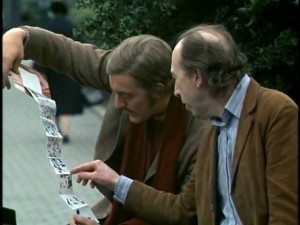 Admittedly though, the way the film looks is wonderful for being De Palma’s first. It looks as good as many of the films it steals from. The framing on the “voyeur” scene is particularly good, and the movie knows it. It forces you to know this, by describing it as it is shown. Perhaps the writing here is indicative of De Palma’s experience in directing actors and the difficulties involved. Flashing title-cards in constantly switching psychedelic colours, and the still images are interesting and reinforce the “Monkees” look mentioned. It is easy to spot that De Palma has talent. Good thing too, because in the near forty years since this film, we have been given a plethora of better films by him. It is always interesting to watch the first film of an established director. The film is worth seeing on those grounds alone, and it is worth completing De Niro’s story by seeing Hi, Mom! which is a much darker, and more funny film.
Admittedly though, the way the film looks is wonderful for being De Palma’s first. It looks as good as many of the films it steals from. The framing on the “voyeur” scene is particularly good, and the movie knows it. It forces you to know this, by describing it as it is shown. Perhaps the writing here is indicative of De Palma’s experience in directing actors and the difficulties involved. Flashing title-cards in constantly switching psychedelic colours, and the still images are interesting and reinforce the “Monkees” look mentioned. It is easy to spot that De Palma has talent. Good thing too, because in the near forty years since this film, we have been given a plethora of better films by him. It is always interesting to watch the first film of an established director. The film is worth seeing on those grounds alone, and it is worth completing De Niro’s story by seeing Hi, Mom! which is a much darker, and more funny film.
Analysis by a lawyer: Richard Stracke
Greetings is little more than a curiosity piece. It hints at De Palma’s future themes, but as a whole, it lacked the focus to satisfy on its own merits. My response may be shorter than usual because the film’s details began to escape me minutes after the credits rolled.
The film is a loose collection of scenes. There is a thread of plot involving attempts to avoid military service. This sounded promising because I expected to identify with such sentiments. The film was disappointing because few of the scenes said anything that remains relevant. He jumps from topic to topic without a clear focus. War, a lost generation, conspiracy theories- The same sentiments have been expressed in other films (then and now), but without a real sense of what was being attacked, nothing sticks. De Palma may have landed a few good jabs, but he misses far more than he succeeds.
The film appears heavily influenced by early nouvelle vague- specifically Godard. The young actors, social concerns and scenes on the streets of New York suggest that De Palma was attempting a vibrant ‘youth film’. Young De Niro and his co-stars handle the material as best they could. His quirks and solid comic delivery are already evident. Unfortunately, rather than feeling irreverent or subversive, most of the scenes seemed like the work of amateurs. In some instances, I was so disinterested that I stopped paying attention to anything that was being said.
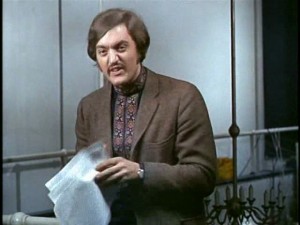 The most interesting scenes were those that hinted at his future obsessions with voyeurism and the male gaze. De Niro’s misogynistic attempt at capturing ‘real life’ in the scene when he films a young girl who is getting ready for bed looks toward one of De Palma’s favorite topics. This and a few of the other characters’ seemingly sudden sex scenes came closest to making important observations. They play with the frequent ridiculousness of erotic cinema. These ideas transcend the rest of the film because they are not tied to the Mod/Vietnam era.
The most interesting scenes were those that hinted at his future obsessions with voyeurism and the male gaze. De Niro’s misogynistic attempt at capturing ‘real life’ in the scene when he films a young girl who is getting ready for bed looks toward one of De Palma’s favorite topics. This and a few of the other characters’ seemingly sudden sex scenes came closest to making important observations. They play with the frequent ridiculousness of erotic cinema. These ideas transcend the rest of the film because they are not tied to the Mod/Vietnam era.
I also appreciated the numerous references to Blow Up. It seemed as much an influence as French New Wave was in the off the cuff street scenes. To my dismay, after a handful of such references, it seemed like De Palma and crew were referencing the work of an established auteur to give weight to their project. I can’t blame them. If I were making a film I would be tempted to include all sorts of ‘clever’ references. Unfortunately, in this early period De Palma had yet to find the balance between charming homage and desperate name dropping.
In conclusion, this film is likely to interest few outside of the rabid cinephile crowd. De Palma completists will consider the hunt for his career spanning motifs an amusing diversion. The same goes for De Niro. He was already a capable scene stealer. If you’re not interested in charting the meteoric progress of either player the film will appear mediocre at best.
Analysis by an elitist: Adam Lippe
It is by now a tired assertion to question Brian De Palma’s originality and willingness to pilfer the past. Since Quentin Tarantino admits to being a huge admirer, and he is quite forthright about lifting whole scenes from films he feels strongly about and placing them in his own movies and simply adjusting the context. De Palma’s Greetings is a clear homage/steal from Godard, specifically his pre-political anarchic period. Actors address the camera, discuss graphic sexual acts, and engage in random aberrant behavior, juxtaposed with goofy music. In fact, considering the theme song and the occasional sped-up footage, Greetings plays as if De Palma had made Godard’s Week End, starring The Monkees.
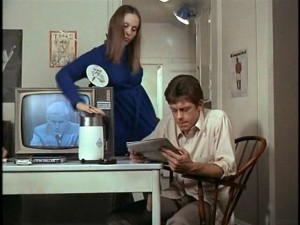 Godard is clearly not the only influence on Greetings. Richard Lester’s popular Beatles’ movies, A Hard Day’s Night and Help!, which tinged with acceptable levels of raucousness for the time, is another inspiration, especially with the constant breaking of the fourth wall. But it seems as if De Palma never chose to delve any further than doing impressions, as none of the characters amount to more than types, rather than people. He also has no interest in narrative, as there is no actual story in Greetings, just digs at the government via the various ways to get out of the draft, sexual mores, conspiracy theories, and parodies of popular films of the time, like Blow-Up. When he made a larger version of the material in 1981 with Blow Out, he learned to focus on his targets with precision, rather than flailing around, like an amateur/virgin.
Godard is clearly not the only influence on Greetings. Richard Lester’s popular Beatles’ movies, A Hard Day’s Night and Help!, which tinged with acceptable levels of raucousness for the time, is another inspiration, especially with the constant breaking of the fourth wall. But it seems as if De Palma never chose to delve any further than doing impressions, as none of the characters amount to more than types, rather than people. He also has no interest in narrative, as there is no actual story in Greetings, just digs at the government via the various ways to get out of the draft, sexual mores, conspiracy theories, and parodies of popular films of the time, like Blow-Up. When he made a larger version of the material in 1981 with Blow Out, he learned to focus on his targets with precision, rather than flailing around, like an amateur/virgin.
This is fairly typical of young filmmakers, trying to fit too much into their early films, hoping one of their many bullets will pierce, spraying in all directions. Greetings goes from one non-sequitur scene to another, thankfully never taking itself too seriously. Blow Out, by comparison, manages to fit in a wide array of compelling characters, sharp blows about political cover ups and how technology can be used against those most knowledgeable about it, often in an ironic fashion. De Palma misses out in Greetings, never realizing that to be able to follow around a character you understand and believe in is the easiest ways to slide in whatever points you may be trying to make. It’s why the best moment in the film, is the one that is most realistic. When De Niro’s character is approached by a man peddling stag porn loops, as he tries to spy on a woman he is following, the peddler will not leave him alone until he gets his attention and finally buys something from him. The humor derived from the situation, even while De Niro is being sleazy, he is trumped and can’t seem to get a moment of privacy for something that obviously requires solitude, as well as the Larry-David-like feeling of being too polite to say no to someone, no matter how offensive or awkward the offer, just to avoid a confrontation, is probably the direction the film should have gone in.
The material that De Palma seems most interested in, falls apart because of the cartoonish approach. Everything dealing with the JFK assassination, including the scene where Gerrit Graham is approached by the guy in the bookstore and when he is shot for “knowing too much,” has no impact and feels like a lousy blackout sketch. In fact, the main issue is that the whole film is a series of faintly connected sketches, often lacking a punchline or an out, so when De Palma cuts to the next scene, there is an empty feeling.
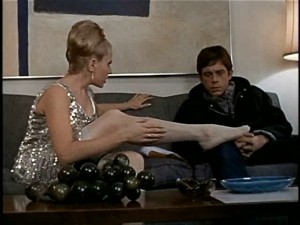 This may have been the problem with a lack of experience, or most likely, De Palma’s inability to direct straight comedy. In his later thrillers, such as Dressed to Kill, the humor was always an undercurrent, tingling right under the violent and threatening surface. If the jokes were overt, or more verbal (as his expertise has been proven to be mostly visual), they fell apart. Like the early scenes in Dressed to Kill, where Angie Dickinson comes across the horrors of casual sex, after discovering her lover’s medical records, what is funny is her awkward realization and her unsubtle penalty for what seemed as if it were a necessary impulse. But a lot of the dialogue with Nancy Allen, as the hooker, is so on-the-nose crude that it verges into unintentional humor. This is a big problem early in Greetings, where the three men try to find ways out of being drafted, and the dialogue is obviously intended to shock with the constant racial epithets and homophobic remarks, but comes off as self-conscious and trying too hard, derailing the attempts at social commentary. The same issue is inherent in the scene where Gerrit Graham shows the path of the bullets through JFK’s body, via an uncooperative and naked woman lying next to him. The ideas are clever, but the delivery is too self-aware and cute to be effective.
This may have been the problem with a lack of experience, or most likely, De Palma’s inability to direct straight comedy. In his later thrillers, such as Dressed to Kill, the humor was always an undercurrent, tingling right under the violent and threatening surface. If the jokes were overt, or more verbal (as his expertise has been proven to be mostly visual), they fell apart. Like the early scenes in Dressed to Kill, where Angie Dickinson comes across the horrors of casual sex, after discovering her lover’s medical records, what is funny is her awkward realization and her unsubtle penalty for what seemed as if it were a necessary impulse. But a lot of the dialogue with Nancy Allen, as the hooker, is so on-the-nose crude that it verges into unintentional humor. This is a big problem early in Greetings, where the three men try to find ways out of being drafted, and the dialogue is obviously intended to shock with the constant racial epithets and homophobic remarks, but comes off as self-conscious and trying too hard, derailing the attempts at social commentary. The same issue is inherent in the scene where Gerrit Graham shows the path of the bullets through JFK’s body, via an uncooperative and naked woman lying next to him. The ideas are clever, but the delivery is too self-aware and cute to be effective.
The chat.
Rhett “Spend a day or two with uncle Saaaaaaaaaaaaaaaaaaaaaaaaaam”
Adam I think it is important to note that De Palma is such a rip-off artist, that he even stole from Soderbergh, and Schizopolis, 28 years in the future.
Rhett Definitely. I was struck by how loose and free-flowing the entire film was considering what a visual perfectionist De Palma would later become.
Shawn De Palma has still given us a boatload of awesome movies. Of which Greetingswasn’t one.
Richard It seemed like a take on the off the cuff feeling of the French new wave.
Adam Yes, very Godard, but without the confidence. The problem was an inability to commit. Scenes have no point or direction. And then they end.
Richard I never knew what the real target was, too scattershot.
Rhett I think that might have been the point, to be as far removed from classical Hollywood as possible. A celebration of the artistic freedoms that came with the fall of the production code and the HUAC.
Adam But it lessens the effectiveness.
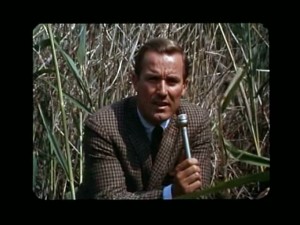 Shawn You honestly believe that that was the point?
Shawn You honestly believe that that was the point?
Richard I saw those things Rhett and while I felt it would have been a fun film to be involved in making, they left the audience (or at least me) out of most of the fun. If there had been just a tad of direction/targeting, it could have been infinitely improved
Adam Though I was being facetious with the Schizopolis comparison, look at how they each handle similar style and material. The key is, Soderbergh gives us character moments, odd humanity, irony, and satirical situations. De Palma just gives us the situations, no characters, no one to follow, just blindly pointing his gun.
Rhett There is definitely a feeling that something is missing. And in ways he rectifies that with Hi, Mom!, since he keeps the focus on De Niro’s character there.
Adam You can see where he was going with Blow Out later, but I don’t think direct comedy is De Palma’s strong point.
Shawn I get the same feeling from Raimi’s early films. There is seemingly no purpose then to entertain himself and his friends, not the viewer.
Richard Speaking of which, Shawn mentioned that Hi, Mom! was much better, was it stronger?
Rhett Hi, Mom! feels much more tame, it doesn’t quite have the hip sixties feeling of Greetings.
Shawn Hi, Mom! is considerably darker in context though. And it seems to have a purpose to it.
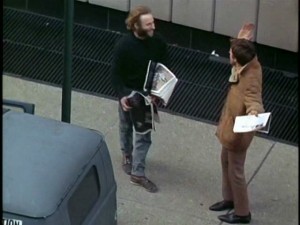 Rhett To me, Greetings was like every major cultural preoccupation bottled up into one little episodic movie. Vietnam, conspiracy theorists, college chic, etc.
Rhett To me, Greetings was like every major cultural preoccupation bottled up into one little episodic movie. Vietnam, conspiracy theorists, college chic, etc.
Adam But Rhett, isn’t focus needed? The whole movie is so agitated and jittery, but it’s never focused.
Richard I did like the way that it could be an uncensored snap shot of the era.
Shawn Yes, but it doesn’t stay with one thing long enough to create any feeling.
Rhett Yeah, it’s more like a best of highlight of the decade than anything of any real substance.
Adam It reminded me, oddly enough, of Mel Gibson’s nutso cabbie in the first section of Conspiracy Theory, throwing out everything until it stuck but not being coherent or sensical up to that point.
Rhett I thought it had some really bare documentary-like moments, the clips of LBJ, and the long, uninterrupted peep art shot by De Niro.
Shawn Greetings reminded me of an episode of Growing Pains that I saw forever ago. One of the kids decided to direct a camcorder movie just to be able to kiss a girl.
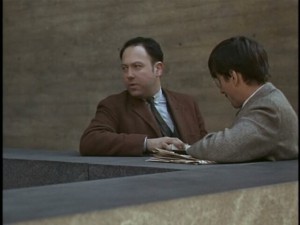 Richard The peep show scene was my favorite because it hinted at De Palma’s later obsession with the gaze and voyeurism.
Richard The peep show scene was my favorite because it hinted at De Palma’s later obsession with the gaze and voyeurism.
Shawn This was almost an excuse to get women naked. Peep Art is further elaborated on in Hi, Mom!
Rhett Yes, I was about to say that Richard. That is probably De Palma’s most enduring theme throughout all his films. I liked the whole Peep Art concept he devised, how the viewer would look through a telescope towards a window cutout with the film displayed within.
Richard Has he made anything that doesn’t touch on it in at least one scene?
Adam The only thing I liked about it was the scene where the guy was trying to push the stag films on him. That conveyed the uncomfortable humor. I found it very funny that he wasn’t allowed to focus on his peeping.
Rhett There is a great line in Hi, Mom! that touches on that, Adam. I can’t remember it exactly, but it is something along the lines of “See that! Fellini never showed any tits!”
Shawn I love how he hardly tried to hide that he was a voyeur.
Richard Yeah, Adam, I was hoping that the entire film would have that awkward sense of humor.
Rhett The peeping is definitely the best part of the film and it is also the most developed too. The only real idea that follows through with a punchline, with the great final Vietnam scene.
Adam It plays into De Palma’s uncomfortable relationship with women, such as the fact that he married Nancy Allen, but only had her play a whore or an idiot.
Shawn Yes, the final scene is by far the best. But I was disappointed that Vietnam wasn’t shown as anything really other than a plot device.
Richard What about his obsession with referencing other films- Blow-Up especially? It seemed to be fun for them, but did it add anything to the film?
Rhett The movie’s loose structure even helps the punch line even more since you think it is just another case of bad editing, leaving the scene on way too long, but then when you finally realize what is going on it makes it that much more funny.
Shawn What about the JFK obsession? It really distances that character from the other two.
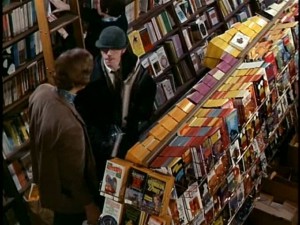 Rhett If we are comparing the film to Godard, maybe all the film references are De Palma’s way of referencing Breathless with all its Bogartisms, not to mention predicting Blow Out.
Rhett If we are comparing the film to Godard, maybe all the film references are De Palma’s way of referencing Breathless with all its Bogartisms, not to mention predicting Blow Out.
Richard I’ve never found the JFK conspiracy theory stuff particularly interesting, so that, especially the bookstore scene fell flat for me. But it did remind me of a similar scene in ‘Slacker’
Adam Richard, even in something like Annie Hall, where it is used to avoid intimacy?
Shawn I thought about the Slacker connection too. That bookstore scene was inspired in how it connected to the next character.
Richard Adam- I don’t mind it there- when it seems to have a purpose. It is just the idea of rambling incoherently about it that turns me off. And that seemed to be going on in Greetings.
Adam Not to defend it, since I rather disliked that scene too, but doesn’t it effectively convey the bizarre paranoia of the time, even on the governmental side? That they would still kill Gerrit Graham despite his theories being on the level of lunacy
Richard Those are good points Adam, but to be honest, I just wasn’t engaged enough to care.
Rhett I thought the lighthearted temperament and free-flowing structure also provided De Niro with a great atmosphere to really have fun with the character. It’s probably one of De Niro’s most energetic performances.
Shawn I still thought the JFK guy was the most entertaining character. At least he had a hobby and the drive to pursue it. De Niro’s obsession with voyeurism when he is about to go off to war seemed… inaccurate.
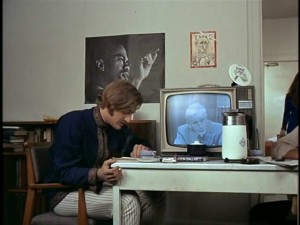 Rhett Gerrit Graham is such a vanity star. In almost everything I have seen him in he tries to shout the loudest to steal the scene.
Rhett Gerrit Graham is such a vanity star. In almost everything I have seen him in he tries to shout the loudest to steal the scene.
Adam It was easier in Greetings, since De Niro underplays so much.
Rhett He does it in Greetings, and especially in Used Cars, where Zemeckis and Russell even poke fun at him over it on the commentary.
Shawn Gerrit’s black sympathizer character in Hi, Mom! was a good performance I thought.
Rhett Yeah, he was much more restrained in Hi, Mom!
Adam However, Rhett, in Used Cars, going over the top is the point, exemplified by Jack Warden and the greatest death scene that ever was.
Rhett “50 bucks never killed anybody.”
Richard Rhett- I did like De Niro’s performance. Very vibrant. Livelier than I expected.
Shawn It was refreshing to see De Niro in such a “light” role.
Richard I went into it thinking he would be some sort of pre-Taxi Driver-ish brooder.
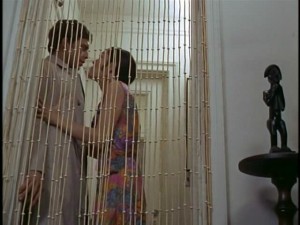 Rhett I thought the whole movie was lively, and that was what I liked most about it. You could always feel that there was a lot of energy that went into the making of it, even if the whole thing doesn’t really synthesize by the film’s end. Speaking of Taxi Driver, there was even a “You talkin’ to me?” line in that film. So on top of Schizopolis, De Palma also stole from Taxi Driver 8 years into the future.
Rhett I thought the whole movie was lively, and that was what I liked most about it. You could always feel that there was a lot of energy that went into the making of it, even if the whole thing doesn’t really synthesize by the film’s end. Speaking of Taxi Driver, there was even a “You talkin’ to me?” line in that film. So on top of Schizopolis, De Palma also stole from Taxi Driver 8 years into the future.
Richard Since it didn’t synthesize, do you think that it would appeal to anyone on its own merits? Not just as a peek at early De Niro/De Palma.
Adam I don’t think so, Richard, especially with the more offensive aspects at the time looking so tame now.
Rhett That is a good question, Richard. I enjoyed it as a voyeuristic look into the themes of the sixties. Given its independent roots, I thought it was one of the purest forms of sixties documentation.
Shawn Well, I think it would fit in well with the “Monkees” fan-types. Since that is what I considered this movie to be. “A very special episode” of The Monkees. I don’t think that anything played as farce could be taken seriously as documentation.
Adam Maybe, Rhett, if it were more relaxed. If the humor had been more casual, and less in-your-face, it might have been a better look at the time period.
Shawn A product of the sixties, sure. But a time capsule? No.
Adam Well, what about something like Laugh-In, which is entirely unsubtle and attempts to be obnoxious but captures the period pretty well.
Rhett I am thinking more of the voyeur scene, the fast-motion scene in the square, the long conspiracy chat between the three guys.
Shawn And Laugh-In‘s jokes were and are mostly relevant. The cast of Laugh-In, and the show, was a bit of 60s revolution and as a result changed the future of television and comedy. The characters in Greetings blow where the wind takes them.
Rhett I am not sure if it was done before, but it seemed that Tarantino lifted from this film in Kill Bill. Specifically from the scene where the assassin’s name is bleeped out repeatedly, just like Beatrix Kiddo’s was.
Adam That occurred to me, but I think Tarantino was just trying to be self-consciously cute by making the name reveal have more meaning later on.
Rhett I guess just De Palma’s way of drawing attention to the fact that you are watching a film. Again, very Godardian.
Shawn I highly doubt this would be a “Tarantino-favorite.”
Rhett Well, given that Kill Bill borrows the De Palma split screens and the whole Dressed to Kill inspired nurse scene, I thought it was just another way for Tarantino to reference De Palma (who himself was referencing Hitchcock, etc.).
Richard Do you think that the majority of the audience at the time of release would have gotten all of the Godard references? I don’t know how well distributed either this or JLG’s films were.
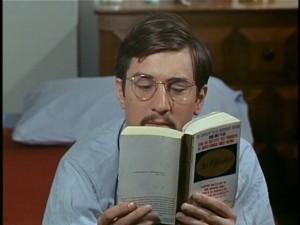 Adam De Palma was Tarantino’s favorite director. He claimed Blow Out was his favorite film and since a lot of the same ideas and themes play out in Greetings, I wouldn’t doubt there would be an ode to Greetings in some Tarantino film. However, the beeping probably wasn’t it, that’s a bit far to go.
Adam De Palma was Tarantino’s favorite director. He claimed Blow Out was his favorite film and since a lot of the same ideas and themes play out in Greetings, I wouldn’t doubt there would be an ode to Greetings in some Tarantino film. However, the beeping probably wasn’t it, that’s a bit far to go.
Rhett Yeah, Tarantino would surely have liked this. I can’t recall any other films that use the beep in that same context, anyway.
Shawn Enough to pull from it? Pulling from say, Thriller makes sense, because it works as an in-joke to the genre he is homaging/stealing from. He wants people to see the reference. I don’t think that Greetings falls into a “cultish” type of film that there is a small group that worships it.
Richard It could have been a way to really demonstrate the depth of his De Palma knowledge. Only a few would see the reference, but they might appreciate it.
Adam Well that would put me back on the “Tarantino making references for the sake of making references” bandwagon.
Richard Is there much record of critical response upon release? It would be interesting to know if critics/audiences found it funnier then.
Rhett Pauline Kael liked it. She peppers her comments on it in some of her later De Palma reviews.
Shawn I am surprised that De Palma was able to get a sequel produced. The JFK guy’s “death” was it supposed to be a joke?
Adam I believe so. Not that it was funny.
Shawn Make a statement?
Rhett Just kind of poking fun of the relative seriousness of the time, with the war and all that going on.
Shawn Another thing that bothered me. The friends seemed a lot more close-knit at the beginning of the film. But eventually got to the point where neither of them were with, or mentioned any of the other.
Rhett I did wonder why it flashed “18” before he got shot though.
Adam Because he was the 18th witness to be killed.
Shawn Only, it was mentioned earlier that 16 witnesses were killed. So unless the guy that tipped him off was killed. #17 survived.
Adam Aren’t we to assume that the guy in the book store was killed too?
Richard Shawn- do you think that was a statement on the dehumanization of the war/time? Even the best of friends torn apart by society?
Shawn No, because society didn’t take them apart. They just went and did their own thing. Whereas the first half of the film portrays them to be inseparable, with The Monkees style motion shots.
Rhett Maybe the buddy stuff at the start was just a way to try and tie all the separate plot threads together. I don’t know if De Palma had any big political message behind it, considering how aloof the entire film appears to be.
Shawn Well if that was the case, I think it would have been more effective to have the “buddies” meet more towards the center of the film.
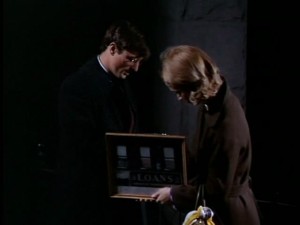 Rhett Was computer dating really something going on then?
Rhett Was computer dating really something going on then?
Shawn I’m sure it was to a primitive degree. Since it was referenced in Hi, Mom! too.
Adam They do it in Harold and Maude too.
Richard I thought about that too. I remember my parents mentioning that the idea of computer dating (filing in a little Scan-tron like card, mailing it off and getting a ‘match’ mailed back) seemed laughable to them. So, it was definitely going on in the mid 70s if not earlier.
Rhett I was surprised to read that it was the first X-rated film released in America. I guess history books tend to overlook that because it was very obscure and not really shocking in the least bit.
Shawn Well it did have quite a bit of full frontal nudity. Which, De Palma probably thought, “I need to get ‘full frontal’ before Soderbergh.”
Rhett Nothing like Gerrit Graham’s black penis in Hi, Mom!
Adam IMDB suggests that they cut material to get an R rating, though the same stuff got A Clockwork Orange an X.
Rhett There was a poster for Greetings on eBay the other day and it had a circled X in the corner, dated ’68. So that IMDB claim of it being the first x-rated film is probably true.
Shawn What about the countless porno films released in the US? I am sure something garnered the rating before Greetings.
Rhett Well the rating wasn’t established until 1968.
Shawn Hard to believe Greetings would set that precedent. But I guess it is possible.
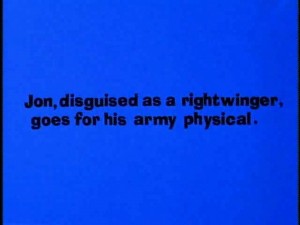 Adam Rhett, as you seem to the most enthusiastic, other than as a collage of ideas, what did you enjoy about Greetings?
Adam Rhett, as you seem to the most enthusiastic, other than as a collage of ideas, what did you enjoy about Greetings?
Rhett Well, I enjoyed the ideas, De Niro, irreverence and the whole voyeurism aspect of it. If a similar film were attempted in any other decade it would seem shoddy or amateur. But Greetings just seems to really work within the time it was made, like perfect carefree college chic.
Adam That depends, because Schizopolis, while equally scattershot, works, because it is not afraid to fail.
Rhett It’s been awhile since I’ve seen Schizopolis, but I remember it having more structure.
Shawn I honestly can’t think of a film that I have seen with less structure. I’m sure there is at least one.
Rhett And that is a quality I enjoy about Greetings.
Adam A lot of Godard of the time is equally random. Free form. But he’d have his point, drive it home, and then move on, not just arrive at the idea, and hope you fill in the rest.
Shawn Were there any points made in this? Or were we just expected to find the hilarity in the silly antics.
Rhett I thought he did a good job at defining the voyeur.
Richard That was my issue with it- no punchline to most of the scene, the voyeur being the exception.
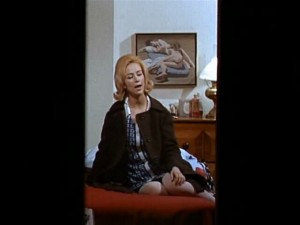 Rhett “Peepers are persevering optimists” – always hoping they will see something, even if that is rarely the case.
Rhett “Peepers are persevering optimists” – always hoping they will see something, even if that is rarely the case.
Shawn Yes but there were two other main characters. Notice how we barely mentioned the “computer dater”? Because the film rushed him and he was uninteresting for the most part.
Adam Well those scenes date badly because we’ve seen the montage of bad dates many times since. It’s as cliched as the rock star try outs.
Shawn But they shouldn’t date that badly. Computer dating was popular straight up until the Internet made it modern.
Adam I know I mentioned it before, but Harold and Maude takes the same idea, and makes it funny. By having a point to the scenes, Harold trying to scare them off creatively, and his mother looking bored by his antics.
Shawn We are all old enough to remember party lines and computer dating.
Rhett I think the film is hampered by the fact that many films afterward (including Hi, Mom!) have taken the relatively inspired themes of Greetings and have explored each one much better. With more depth.
Adam But since is there no character interest in Greetings, we don’t feel that the women are anymore annoying or obnoxious than the guy we are supposed to sympathize with.



